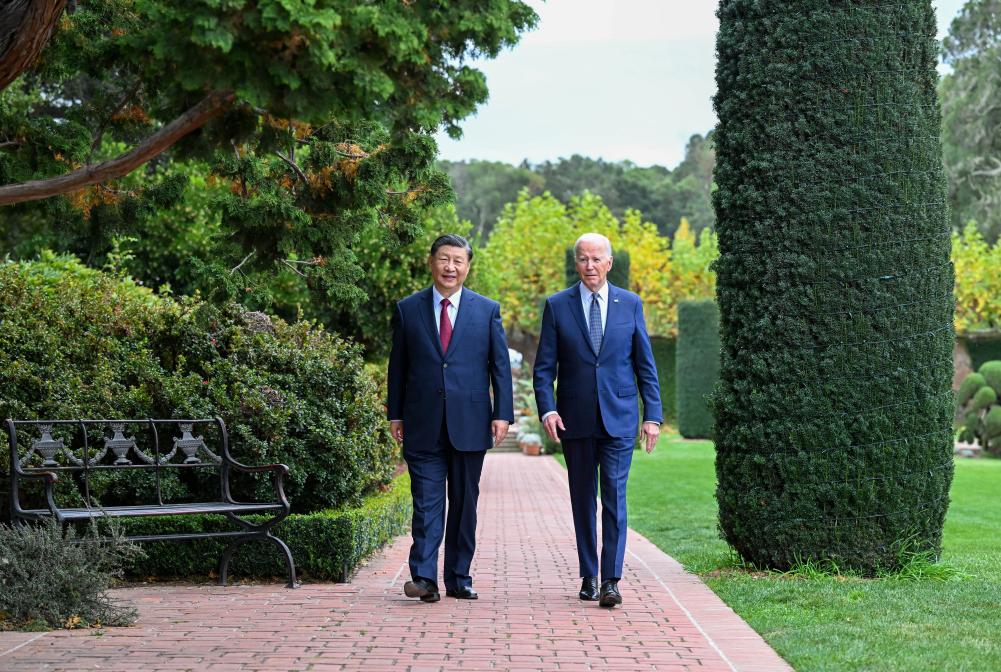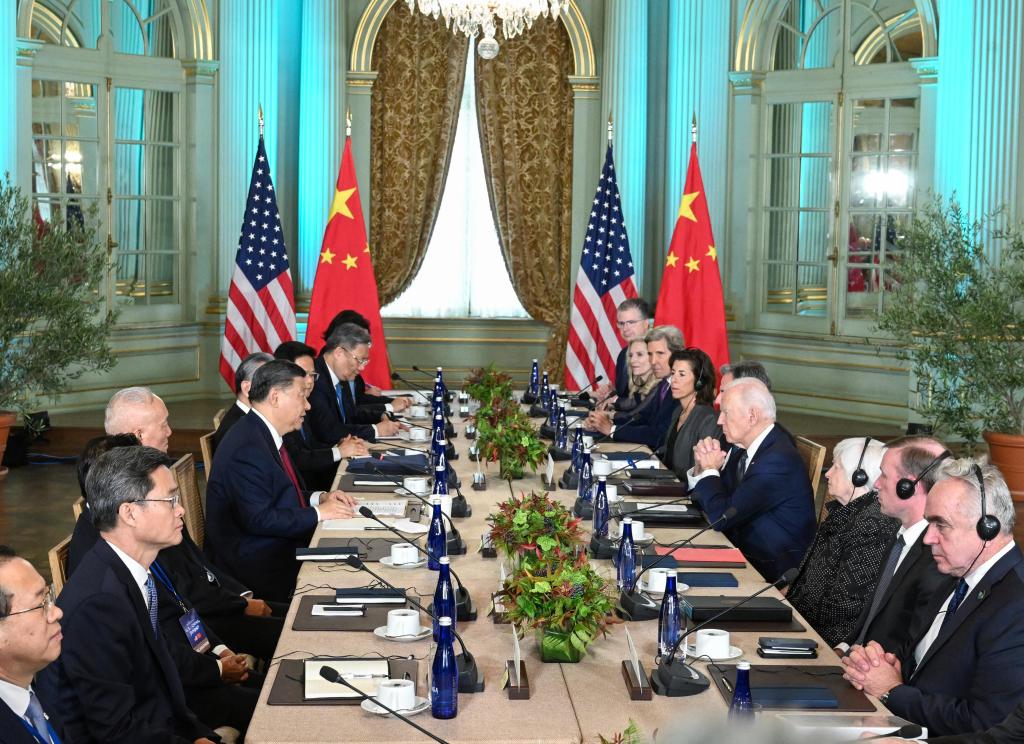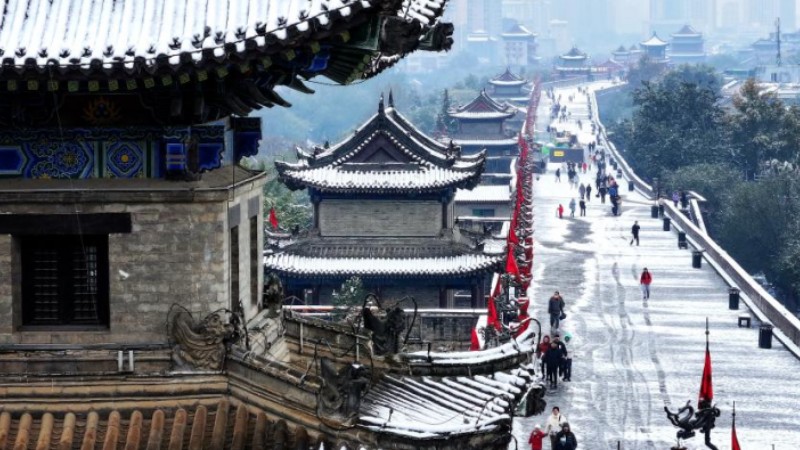Xi, Biden conclude ‘strategic, historic and directional’ summit Forming a forward-looking ‘San Francisco vision’, head-of-state diplomacy injects greater stability into world

Chinese President Xi Jinping and US President Joe Biden take a walk after their talks at the Filoli estate in the US state of California on US local time November 15, 2023. (Photo/Xinhua)
After four hours of face-to-face, in-depth and comprehensive talks, the Chinese and US leaders concluded a significant China-US summit on Wednesday local time that is seen as strategic, historic and directional, forming a forward-looking "San Francisco vision" and setting the direction for a healthy, stable, and sustainable development of China-US relations.
Chinese President Xi Jinping met with US President Joe Biden for a summit at the Filoli estate in the south of San Francisco on Wednesday local time. The two leaders had a candid and in-depth exchange of views on strategic, overarching and directional issues concerning China-US relations, as well as major issues concerning world peace and development.
The two sides agreed to promote and strengthen dialogue and cooperation in various fields, including to establish China-US government talks on AI, to establish a working group on counter-narcotics cooperation, and to resume, on the basis of equality and respect, high-level military-to-military communication, the China-US Defense Policy Coordination Talks, and the China-US Military Maritime Consultative Agreement meetings and to conduct telephone conversations between theater commanders.
They also agreed to work toward a significant further increase in scheduled passenger flights early next year and to expand educational, student, youth, cultural, sports and business exchanges.
This China-US summit sent a positive and stable signal to the world, indicating that both China and the US are intent on easing and stabilizing bilateral relations and seeking opportunities for cooperation, some experts said. The meeting not only advanced the resolution of specific issues, improving bilateral relations, but also established a consensus for the development of China-US relations in the next phase, making plans and forming "a road map," they noted.
Some experts hailed this highly anticipated summit as injecting greater certainty and new momentum into an uncertain world.
A slew of outcomes from the summit indicates that it has become apparent that both Beijing and Washington no longer harbor illusory hopes for a rapid breakthrough or significant improvement in relations, some experts said. However, both sides also recognize the benefits of keeping tensions at the current level and preventing further deterioration.
Whether this summit can be seen as an important milestone in the overall progress of bilateral relations, and whether the two countries can continue to move forward is the real test of the sincerity and determination of the US side, especially after the Chinese leader had articulated comprehensively China's stance on stabilizing and improving bilateral ties, Chinese experts said.

Chinese President Xi Jinping meets with U.S. President Joe Biden at Filoli Estate in the U.S. state of California, Nov. 15, 2023.(Photo/Xinhua)
Various results
"The two heads of state had a very good, comprehensive, and in-depth meeting at the Filoli estate," Chinese Foreign Minister Wang Yi told a group of reporters after the summit on Wednesday.
The outcomes of the China-US summit are multifaceted. On the basis of mutual respect, equality, and mutual benefit, the two sides discussed dialogue and cooperation in various fields, reaching over 20 points of consensus in areas such as political diplomacy, cultural exchanges, global governance and military security, Wang said.
What the US received from the summit is the restoration of communication and cooperation in multiple channels, including anti-drug law enforcement and military. What China wants from the meeting is to openly and confidently form a manageable future for bilateral ties from a strategic level, Jin Canrong, associate dean of the School of International Studies at the Renmin University of China, told the Global Times on Thursday.
During the four-hour meeting, the two leaders also communicated comprehensively on global challenges such as the Palestinian-Israeli conflict, the Ukraine crisis, climate change, and artificial intelligence. They further explored the proper way for the two major countries to coexist and clarified the major responsibilities shared by China and the US, Wang said.
Lü Xiang, an expert on American studies at the Chinese Academy of Social Sciences, told the Global Times on Thursday that "the US is very concerned about the Ukraine crisis and the ongoing crisis in Gaza, and the two leaders would surely have mentioned these topics during their meeting, because the US desperately needs help. China will firmly maintain its neutral and fair stance for promoting peace and seeking the possibility of mediation."
Unstoppable reunification
On the Taiwan question, Xi emphasized during the summit with Biden that it remains the most important and sensitive issue in China-US relations, and China values the positive statements made by the US side during the Bali meeting.
The US side should take real actions to honor its commitment of not supporting "Taiwan independence," stop arming Taiwan, and support China's peaceful reunification. China will realize reunification, and this is unstoppable, Xi stressed.
This time, the Chinese top leader openly and directly urged the US side to support China's efforts for "peaceful reunification," and this is a significant message to the US and the world, Jin noted.
As the US side has repeatedly expressed its concerns about a potential war in the Taiwan Straits, it's necessary to let the US understand that "if one day a war breaks out in the region, it means China has completely lost hope for peaceful reunification, most likely due to US interference," and that's why China urges the US not to arm the island of Taiwan, said Lü.
If the US doesn't want to see a war, the correct solution is to support China's efforts to realize reunification peacefully. And if the US shows duplicity on this matter or does the opposite to disrupt China's peaceful reunification process, the US will see undesired consequences, said experts.
Biden said during the meeting with Xi that the US adheres to the one-China policy, welcomes dialogue between government agencies at various levels, and is ready to maintain open and candid communication with China to increase understanding, avoid misperceptions and manage differences.
Biden said the US does not support "Taiwan independence" and has no intention to have a conflict with China.
Uncertainties remain
The substantial outcomes of the Xi-Biden summit help to weave "more resilient ties" for China-US relations, especially, for example, when China showed ample goodwill on the restart of drug control cooperation mainly following a demand from the US side, some experts said.
But it is very important to ensure that the established working groups and communication channels are effectively utilized, they said, noting that US domestic politics could pose a number of challenges to bilateral relations.
As for the future of China-US relations, Chinese experts are being cautious because there will be great uncertainties for the US next year.
The Chinese top leader has shown responsibility, courage and confidence to actively shape and manage bilateral ties, but next year, the US will enter its presidential election year, and the regional leader's election in the island of Taiwan will also take place, so challenges and uncertainties can be anticipated, Jin said.
"To what extent China-US relations can prevent the impact of the coming year depends on how the US keeps its promises and how it turns its positive remarks into actions," Lü noted. In 2024, to what extent the Biden administration and the Democrats can retain control of the US is in question, he said.
"The foundation of China-US relations was laid by our peoples," Xi said during the welcome dinner on Wednesday, stressing that "the door of China-US relations was opened by our peoples… The stories of China-US relations are written by our peoples… and the future of China-US relations will be created by our peoples."
Jin said Xi's visit was not only an engagement with the Biden administration, but also with different sectors of the US, and in the future, China will make more efforts to exchange with other parts of the US, including civil groups, business circles, youth and the governments of different states, to make China-US relations more flexible and multidimensional.
Photos
Related Stories
- Xi says China remains committed to peaceful development
- Xi calls on APEC members to stick to innovation, openness in boosting regional development
- FLASH: XI CALLS FOR BUILDING OPEN, DYNAMIC, RESILIENT AND PEACEFUL ASIA-PACIFIC COMMUNITY
- Staying True to APEC Founding Mission And Enhancing Unity and Cooperation To Jointly Promote High-Quality Growth in the Asia-Pacific
- Xi reiterates opposition to politicizing economic, trade issues
Copyright © 2023 People's Daily Online. All Rights Reserved.









